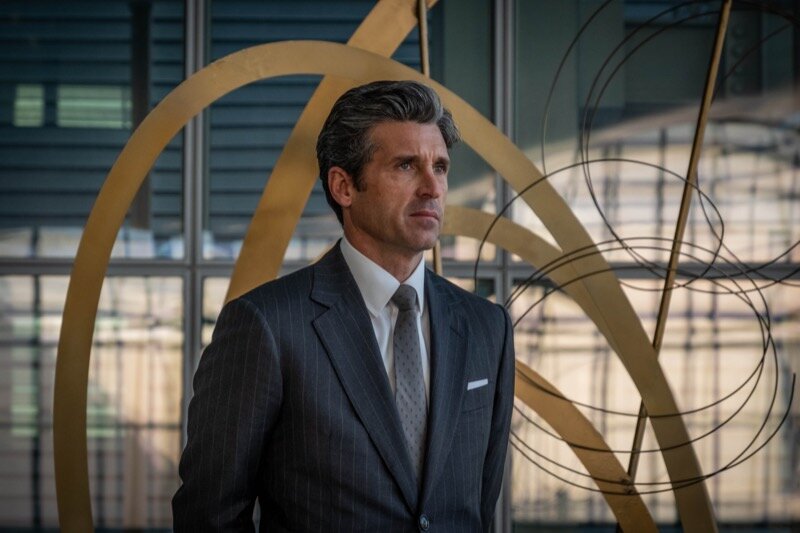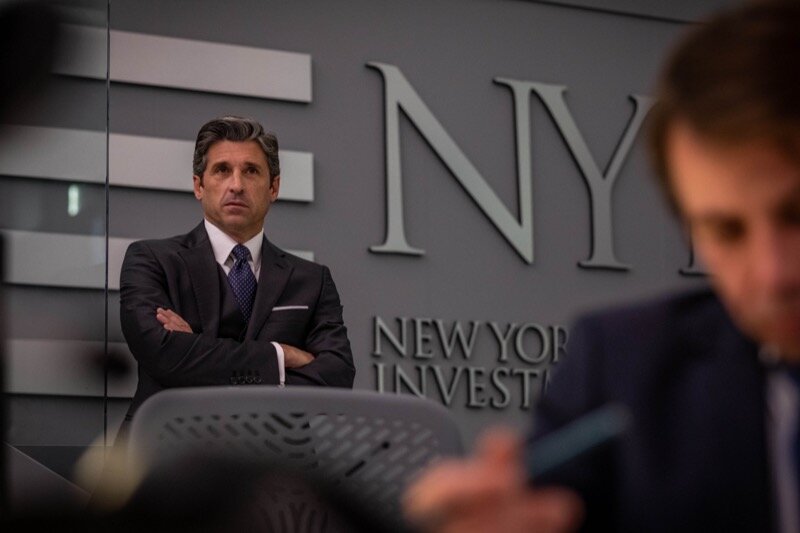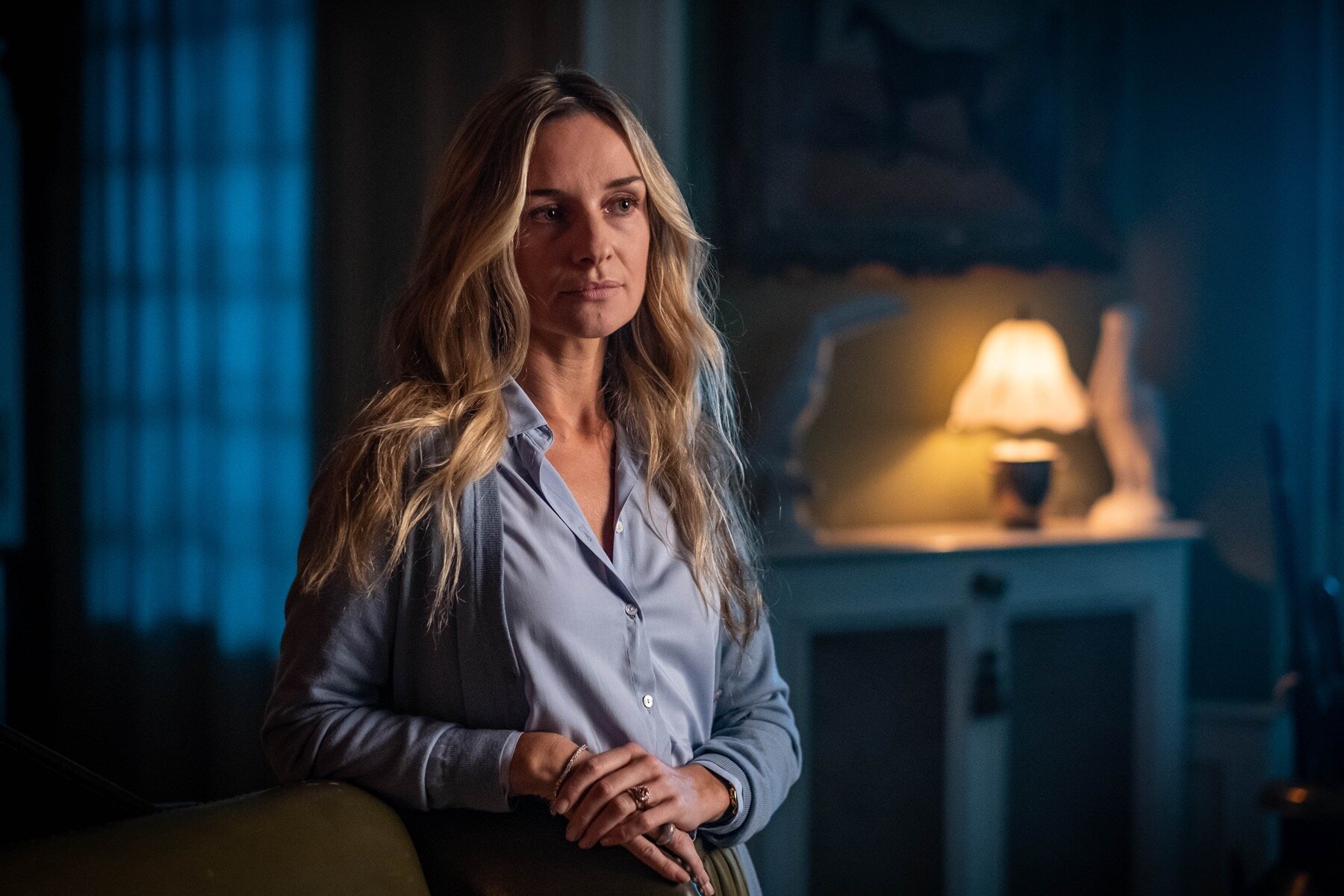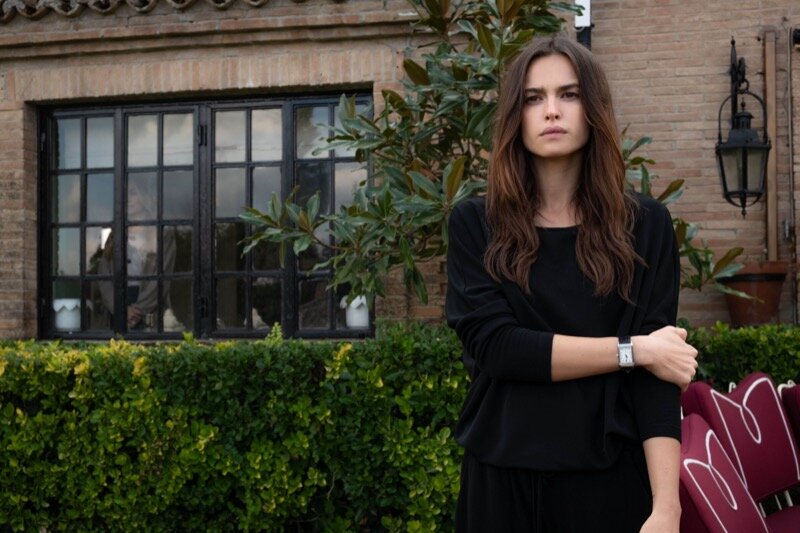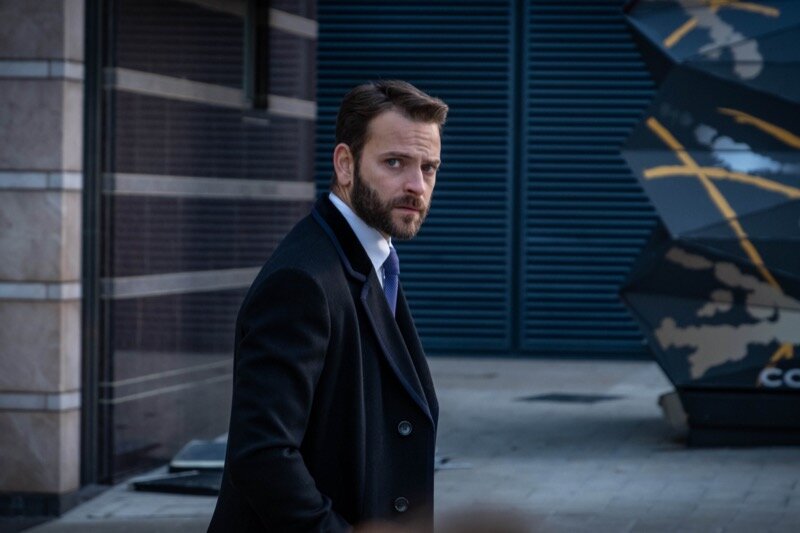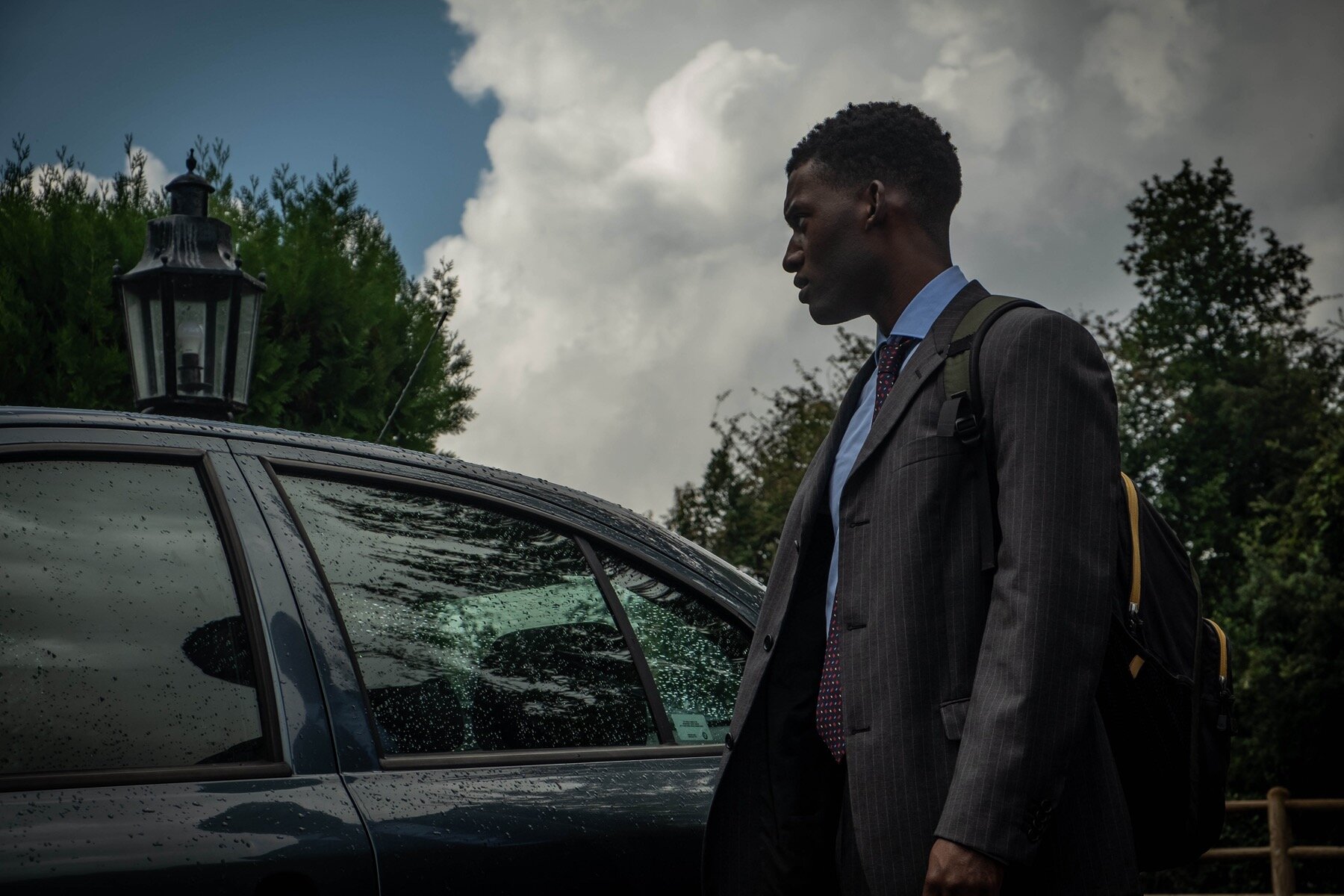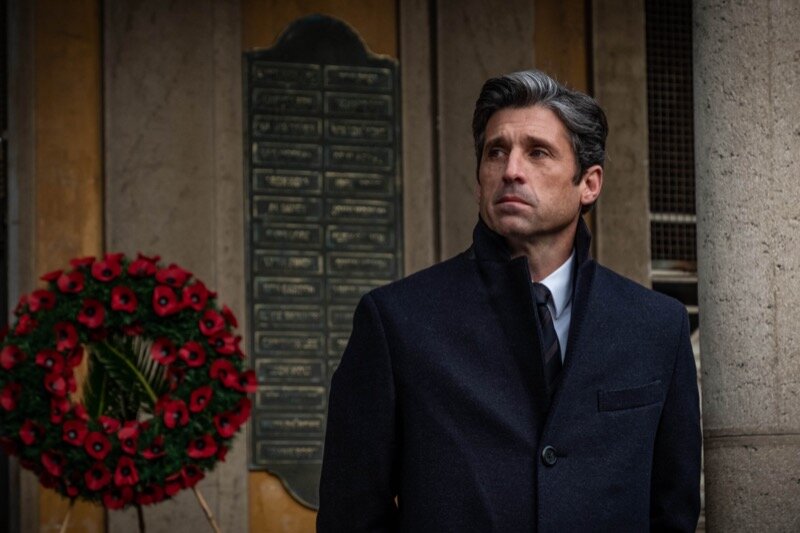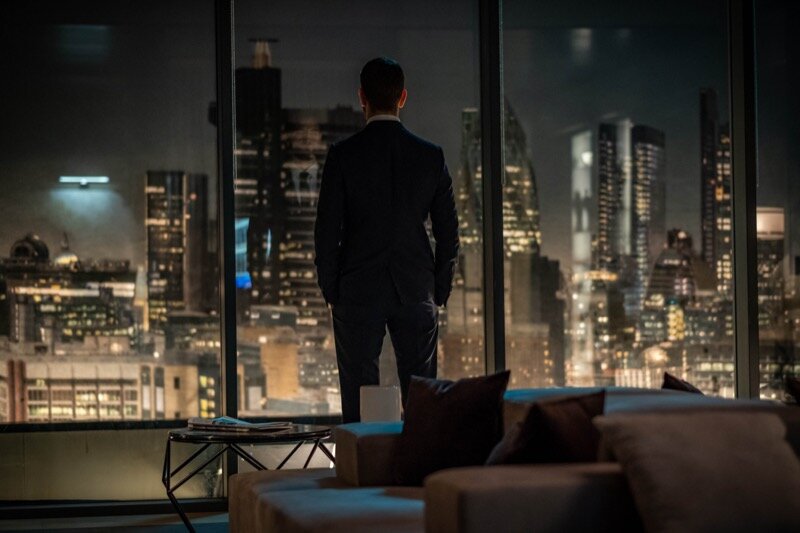DEVILS
Patrick Dempsey talks to The Cheshire Magazine about his upcoming role in the Sky Original thriller based on Guido Maria Brera’s bestseller
Alessandro Borghi stars in Devils as Massimo Ruggeri, the Head of Trading at one of the most important investment banks in the world. Massimo’s successes have seen him make hundreds of millions of dollars for his employers, and with it, all but certain promotion to vice-CEO. However, a scandal involving his wife puts a brake on Massimo’s ambitions, leading his American CEO and mentor, Dominic Morgan (Patrick Dempsey), to withdraw his support. Massimo takes this rejection hard, and things go from bad to worse when his rival and apparent successor suddenly dies, and Massimo becomes the prime suspect. Sensing that Dominic is hiding something, Massimo sets about clearing his name and finding out the truth behind the vast political game plan he has inadvertently been caught up in.
What attracted you to this project?
When I read the script I kept turning the page. I was so intrigued, wondering, ‘Where is this going to end up?’ I loved the insight into the financial world, and Guido’s vision. It was fascinating to take this financial world which we’re used to seeing from the American perspective and look at it from a European perspective. That feels fresh. And sure enough, the feedback I’ve been getting is that financial people really like it. It has an authenticity. The visual style is really cool, that was another thing that impressed me. They’d been shooting for about a month when I arrived in Europe and they showed me a couple of scenes with Alessandro and I was like, ‘Wow, this has a great look’. It was really exciting to hit the ground running, knowing that. And to be honest, filming in Rome and in London was a big attraction for me.
Can you describe your character, Dominic?
He’s the CEO of the London branch of the New York London bank. His biggest anxiety is chaos and anything that is out of his control.
What’s his relationship with Massimo like?
They’ve known each other for 20 years; Massimo was his protégé. It’s a very complicated relationship where he needs Massimo very much in order to keep control. And I think the vulnerability of that is his weakness. For Dominic it’s a real love; their relationship crosses professional boundaries. It’s a father-son relationship. So when Massimo lets him down it’s a real disappointment, as much as he’s capable of showing vulnerability. There’s a deep love story between these two men and that’s what makes the betrayal so profound for both of them. One of the things about this series is who betrays who first, and why. Loyalty is key to all of this and the most fascinating aspect of Devils.
What’s Dominic’s marriage to Nina like?
They have lost their son and that has, understandably, destabilised their marriage. But they understand the importance of their union on a professional level, and they are trying to navigate the personal and professional worlds despite their grief.
As an audience, the script plays with our perceptions: we never know who to trust or who is betraying whom. Is that a challenge, as an actor?
That’s the fun part. And part of the decision of doing this was to play a character like that, and then try to find a balance. I never really got a chance to read the book until I was finished shooting so I didn’t have the benefit of knowing where the story was going. I really had to lean on Nick [Hurran, director] and Guido [Maria Brera, creator and writer] to tell me what’s happening with the story. Then with each take we would try different approaches of the power struggle so that was the fun part, trying to find the right tone and trusting the directors and listening to their feedback and saying, ‘Okay, let’s try this’.
How high are the stakes?
They’re high: what they’re doing in the banks is affecting whole nations. And that’s another thing that I like, because our drama is spliced with real-life news footage which tells the real human story. Through Sofia’s back story, and Massimo’s back story, we see the effect on people on the streets when the banks take these massive gambles. Everyday men and woman are affected. We see how the working-class population in the UK is affected, how a small fishing village in Italy is affected, the tragedy that ensues. I like that aspect of it.
What did you already know about this period in 2011, and what extra research did you do?
I was really fortunate to spend a lot of time with Guido who was wonderful. He was my professor in the world of finance, and in life, really: he’s very much a philosopher. So it was spending time with him and really trying to get an understanding of what it was that he was trying to say, and then helping him with that realisation. We went to Canary Wharf in London, to the bank where Guido used to work. He took us through all the departments, so I got a really good understanding of the bank and its operations. Each floor represented a different country and a different type of investment, and I really got an overview of the banking system. It was fascinating to see it first-hand, to feel the energy on the floor, and also to get a better understanding about what it’s like to be an executive. Then Guido would recommend different books and documentaries. And we were all given a great vocabulary list.
Was that a challenge to learn?
It was fun. We really don’t dumb down any of the dialogue, and certainly the vocabulary, which is why the people who are in the financial world call me to say they love this, because of the insight and subtlety and authenticity of it.
What did you think of the bankers you met?
They were very charming, very well-dressed, well-educated. There was a great diversity from around the world, of course, because they need to understand and represent the country’s clients.
Bankers haven’t been particularly popular since the 2008 crash, have they?
No, but I think it depends on how they handle success and what they do with it. You see some of these really smart corporations who understand the importance of giving back to their communities and supporting local charities and things that need to be given financing. So, if they’re giving money back into their community, I think that’s a good thing. And it’s an important thing, realising the importance of that, that it’s the right thing to do. But it’s a question of greed and capitalism and the sustainability of capitalism and democracy. Those themes are all in play in our series.
Dominic lives in a lovely house and seems quite protected from the effects of some of his decisions.
I don’t think he can afford to feel those ramifications. He makes a calculation before doing a deal and looks at the overall cost and the benefit but he lives in a nice world. He’s a generous friend to the people around him, and I guess he has been a good husband in the past. He’s not irredeemable and he has people around him he has treated well.
Tell me a little about filming on location.
I loved the energy at Canary Wharf in London, it was really exciting. People walking around in suits, busy busy. We did the exteriors there. The rest of the time we were in Rome in an old warehouse, converted into the floor you see that is Dominic’s trading floor. I’ve actually spent a lot of time in Rome so it was good to be back. You have your neighbourhood that you’re living in, and then you have an opportunity to go to the museums, to go out and eat great food. There’s always something to do. And it’s also good to get out to the country on days off because the energy of the city is so intense and exciting. The countryside was beautiful. I was very fortunate to have a nice balance in terms of work and days off. My daughter got to come over and join me and we were able to explore the city and the museums and the history together, which was really a memorable experience for both of us. Fabulous, fabulous.
Can you talk a little about Dominic’s ‘look’?
Everything from the hair to the clothes was so important to get the character. Once you get that right, it’s really easy to move into it. It was about making sure everything was in place and not out of place. The appearance of having it all together was very important. A lot of the suits were handmade by an older gentleman in Italy. That was a really fun process because I think a lot of these financial men working at this level have very well-tailored suits custom-made for them. It becomes less about the money and being flashy and more about the power.
How did you get on with your co-stars?
Alessandro was fantastic to work with; very focused. Our scenes were very intense but he’s a very warm, very giving, very funny, passionate actor to work with. I really enjoyed it through the whole process. And the cast in general, we became really very close because we were on ‘vacation’ together in Rome. There was a great atmosphere on the floor and we were very supportive of each other. It was very much part of the culture to get together and have big group dinners.
Did you enjoy working with an international cast and crew?
I loved it. It was an intense working environment because of the multiple languages that were going on, so we had to really focus and stay on top of it and attune to how people were feeling, but I really enjoyed that process. I think now we’re seeing the power of streaming, how it’s changed the business. Countries aren’t looking to America for content anymore. They’re looking in their own backyard and at their own filmmakers. There’s an opportunity for those filmmakers to show their point of view in a fresh way and have it seen by a worldwide audience.
So you would work in Europe again?
Absolutely. I love it there. 2020 was the longest period of time I spent outside Europe in more than 15 years so it was a hard year in the sense of being locked down and not being able to travel.
Do you think we need agitators like Sofia to find information and hold bankers to account?
I think there’s so much distrust in the world right now, and democracies are really fragile. I also think disinformation on social media has gone out of control. I think there have to be checks and balances. We’re seeing in the States, you know, how dangerous and how challenging that can be. I didn’t realise how fragile democracy was until the election. And look at what’s going on in England, the division that’s happening with Brexit. I definitely think we’re in a period of agitation. We’re looking at really scary environmental issues and if we don’t take care of that, that’s going to mean mass migration, which will put a lot of pressure on certain countries who are already seeing that. And because of the financial devastation of Covid-19, we’re seeing a lot of people are going hungry right now. So a lot is in front of us and it’s going to be hard.
There’s a line in Devils that says the most powerful weapon in the world isn’t guns, it’s finance. Do you agree?
I think it’s money, and power. It’s control, and money helps with that. You know, I think it’s easy to do this broad generalisation that all bankers are bad. I don’t think that’s true. I think it depends on the culture of whatever that company is, which certainly comes from leadership.
Sky Studios presents Devils a Sky Italia and Lux Vide production in collaboration with Orange Studio and OCS “DEVILS” based on the novel I Diavoli by Guido Maria Brera published by Rizzoli
Hungry for more?
Read up on the latest news, delicious eats, travel treats and seasonal style trends in FEATURES, or browse a curated selection of our FEATURED PRODUCTS, meander through our guide to the finest things to do in Cheshire and beyond in WHATS ON or partake in our COMPETITIONS.
About The CHESHIRE Magazine
We are the definitive guide to luxury lifestyle in the North West. Latest news, delicious eats, travel treats and seasonal style trends. The Cheshire Magazine is the largest luxury lifestyle title for the North West of England, dropping directly through the letterboxes of VIP subscribers from the Wirral to Greater Manchester plus all the villages and towns in between and digitally available as a subscription in print and digital on issuu.com worldwide. We specialise in connecting luxury brands to likeminded consumers.
If you are interested on how you can partner with The CHESHIRE Magazine, read more about us. Or get in touch to find out more about marketing, featuring or partnering with the Cheshire Magazine in print or online.





